

Ford Foundation. New York headquarters. Margaret Mead. Margaret Mead (December 16, 1901 – November 15, 1978) was an American cultural anthropologist, who was frequently a featured author and speaker in the mass media throughout the 1960s and 1970s.[1] She earned her bachelor degree at Barnard College in New York City, and her M.A. and Ph.D. degrees from Columbia University. She was both a popularizer of the insights of anthropology into modern American and Western culture and a respected, sometimes controversial, academic anthropologist.[2] Her reports about the attitudes towards sex in South Pacific and Southeast Asian traditional cultures amply informed the 1960s sexual revolution.
Mead was a champion of broadened sexual mores within a context of traditional western religious life. Rockefeller Foundation. The Rockefeller Foundation is a philanthropic organization and private foundation based at 420 Fifth Avenue, New York City.[3] The preeminent institution established by the six-generation Rockefeller family, it was founded by John D.
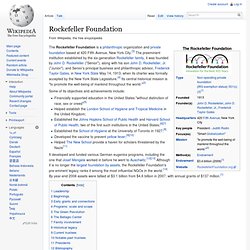
Rockefeller ("Senior"), along with his son John D. Rockefeller, Jr. ("Junior"), and Senior's principal business and philanthropic advisor, Frederick Taylor Gates, in New York State May 14, 1913, when its charter was formally accepted by the New York State Legislature.[4] Its central historical mission is "to promote the well-being of mankind throughout the world. "[2] University of Chicago. The University of Chicago (U of C, UChicago, or simply Chicago) is a private research university in Chicago, Illinois, United States.

The university consists of the College of the University of Chicago, various graduate programs and interdisciplinary committees organized into four divisions, six professional schools, and a school of continuing education. The university enrolls approximately 5,000 students in the College and about 15,000 students overall. The University of Chicago is consistently ranked among the world's top 10 universities.[6][7][8] The university tied with Stanford University for 5th place in the 2014 U.S. News & World Report "Best National Universities Rankings".[9] The University of Chicago is affiliated with 89 Nobel Laureates (including 10 current faculty),[15] 49 Rhodes Scholars[16] and 9 Fields Medalists.[17] It was founded by the American Baptist Education Society with a donation from oil magnate and philanthropist John D.
History[edit] Founding–1910s[edit] National Opinion Research Center. NORC at the University of Chicago is one of the largest independent social research organizations in the United States, established in 1941.
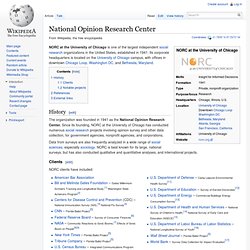
Its corporate headquarters is located on the University of Chicago campus, with offices in downtown Chicago Loop, Washington DC, and Bethesda, Maryland. History[edit] James Samuel Coleman. James Samuel Coleman (May 12, 1926 – March 25, 1995) was an American sociologist, theorist and empirical researcher, based chiefly at the University of Chicago.
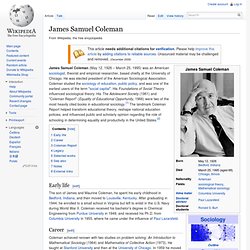
He was elected president of the American Sociological Association. Coleman studied the sociology of education, public policy, and was one of the earliest users of the term "social capital". His Foundations of Social Theory influenced sociological theory. Deutsche Hochschule für Politik. The Deutsche Hochschule für Politik (DHfP), or German Academy for Politics, was a private academy in Berlin, founded in October 1920.
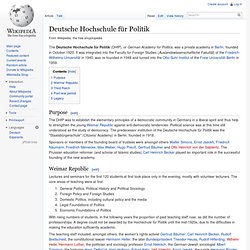
It was integrated into the Faculty for Foreign Studies (Auslandswissenschaftliche Fakultät) of the Friedrich-Wilhelms-Universität in 1940, was re-founded in 1948 and turned into the Otto-Suhr-Institut of the Freie Universität Berlin in 1959. Purpose[edit] The DHfP was to establish the elementary principles of a democratic community in Germany in a liberal spirit and thus help to strengthen the young Weimar Republic against anti-democratic tendencies. Chicago school (sociology) In sociology and later criminology, the Chicago School (sometimes described as the Ecological School) was the first major body of works emerging during the 1920s and 1930s specialising in urban sociology, and the research into the urban environment by combining theory and ethnographic fieldwork in Chicago, now applied elsewhere.
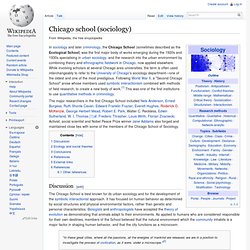
While involving scholars at several Chicago area universities, the term is often used interchangeably to refer to the University of Chicago's sociology department—one of the oldest and one of the most prestigious. Following World War II, a "Second Chicago School" arose whose members used symbolic interactionism combined with methods of field research, to create a new body of work.[1] This was one of the first institutions to use quantitative methods in criminology.
Ernest Burgess. Scholarly Work[edit] Burgess conducted influential work in a number of areas.
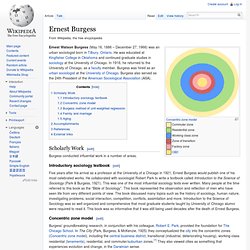
Introductory sociology textbook[edit] Five years after his arrival as a professor at the University of a Chicago in 1921, Ernest Burgess would publish one of his most celebrated works. He collaborated with sociologist Robert Park to write a textbook called Introduction to the Science of Sociology (Park & Burgess, 1921). Robert E. Park. Life[edit] Robert E.
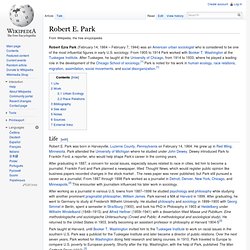
Park was born in Harveyville, Luzerne County, Pennsylvania on February 14, 1864. He grew up in Red Wing, Minnesota. Park attended the University of Michigan where he studied under John Dewey. Dewey introduced Park to Franklin Ford, a reporter, who would help shape Park’s career in the coming years. After graduating in 1887, a concern for social issues, especially issues related to race in cities, led him to become a journalist.
After working as a journalist in various U.S. towns from 1887–1898 he studied psychology and philosophy while studying with another prominent pragmatist philosopher, William James. Park taught at Harvard, until Booker T. Princeton Univ. - Woodrow Wilson School of Public and International Affairs. Robertson Hall, which houses the Woodrow Wilson School.
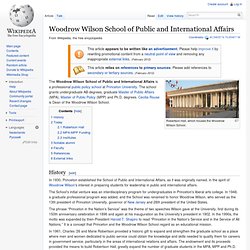
The Woodrow Wilson School of Public and International Affairs is a professional public policy school at Princeton University. The school grants undergraduate AB degrees, graduate Master of Public Affairs (MPA), Master of Public Policy (MPP) and Ph.D. degrees. Cecilia Rouse is Dean of the Woodrow Wilson School. Radio Project. The Radio Research Project was a social research project funded by the Rockefeller Foundation to look into the effects of mass media on society.
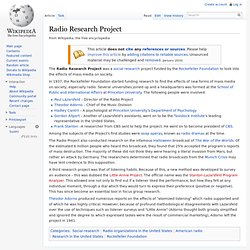
In 1937, the Rockefeller Foundation started funding research to find the effects of new forms of mass media on society, especially radio. Several universities joined up and a headquarters was formed at the School of Public and International Affairs at Princeton University. The following people were involved: Among the subjects of the Project's first studies were soap operas, known as radio dramas at the time. A third research project was that of listening habits. Theodor Adorno produced numerous reports on the effects of "atomized listening" which radio supported and of which he was highly critical. Paul Lazarsfeld - Wikipédia, a enciclopédia livre.
Origem: Wikipédia, a enciclopédia livre. Paul Felix Lazarsfeld (13 de Fevereiro de 1901, Viena, Áustria - 30 de Agosto de 1976, Nova Iorque, Estados Unidos) Biografia[editar | editar código-fonte] Influências[editar | editar código-fonte] Theodor W. Adorno. Harvard University. Harvard University is a private Ivy League research university in Cambridge, Massachusetts, whose history, influence and wealth have made it one of the most prestigious universities in the world.[6][7][8][9][10] The University is organized into eleven separate academic units—ten faculties and the Radcliffe Institute for Advanced Study—with campuses throughout the Boston metropolitan area:[15] its 209-acre (85 ha) main campus is centered on Harvard Yard in Cambridge, approximately 3 miles (5 km) northwest of Boston; the business school and athletics facilities, including Harvard Stadium, are located across the Charles River in the Allston neighborhood of Boston and the medical, dental, and public health schools are in the Longwood Medical Area.[5] Eight U.S. presidents have been graduates, and some 150 Nobel Laureates have been affiliated as students, faculty, or staff.
History Colonial The leading Boston divine Increase Mather served as president from 1685 to 1701. 19th century Charles W. Talcott Parsons. Talcott Parsons (December 13, 1902 – May 8, 1979) was an American sociologist who served on the faculty of Harvard University from 1927 to 1973. Parsons analyzed the work of Émile Durkheim and Vilfredo Pareto and evaluated their contributions through the paradigm of voluntaristic action. Parsons was also largely responsible for introducing and interpreting Max Weber's work to American audiences. Although he was generally considered a major structuralist functionalist scholar, in an article late in life, Parsons explicitly wrote that the term "functional" or "structural functionalist" were inappropriate ways to describe the character of his theory.[1][2] For Parsons, "structural functionalism" was a particular stage in the methodological development of the social science, and "functionalism" was a universal method; neither term was a name for any specific school.
Columbia University. The university was founded in 1754 as King's College by royal charter of George II of Great Britain. Franklin Henry Giddings. Franklin Henry Giddings, Ph.D., LL.D. (March 23, 1855 – June 11, 1931) was an American sociologist and economist, born at Sherman, Connecticut. He graduated from Union College (1877). Bureau of Applied Social Research. Paul Lazarsfeld - Wikipédia, a enciclopédia livre. Robert K. Merton. Robert King Merton (July 4, 1910 – February 23, 2003) was an American sociologist. C. Wright Mills. Charles Wright Mills (August 28, 1916 – March 20, 1962) was an American sociologist, and a professor of sociology at Columbia University from 1946 until his death in 1962. University of Chicago. Social Science Research Council.
The Social Science Research Council (SSRC) is a U.S. -based independent nonprofit organization dedicated to advancing research in the social sciences and related disciplines. Marcel Mauss: a biography. Beardsley Ruml. London School of Economics.